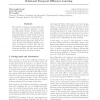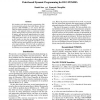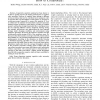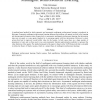43 search results - page 5 / 9 » Decentralized Learning in Markov Games |
ICML
2006
IEEE
14 years 10 months ago
2006
IEEE
We introduce relational temporal difference learning as an effective approach to solving multi-agent Markov decision problems with large state spaces. Our algorithm uses temporal ...
AAAI
2006
13 years 11 months ago
2006
We introduce point-based dynamic programming (DP) for decentralized partially observable Markov decision processes (DEC-POMDPs), a new discrete DP algorithm for planning strategie...
TCOM
2010
13 years 8 months ago
2010
—Cooperative spectrum sensing has been shown to be able to greatly improve the sensing performance in cognitive radio networks. However, if cognitive users belong to different se...
AAMAS
2010
Springer
13 years 10 months ago
2010
Springer
Abstract In this paper, we present a human-robot teaching framework that uses "virtual" games as a means for adapting a robot to its user through natural interaction in a...
IAT
2003
IEEE
14 years 3 months ago
2003
IEEE
A gradient-based method for both symmetric and asymmetric multiagent reinforcement learning is introduced in this paper. Symmetric multiagent reinforcement learning addresses the ...




